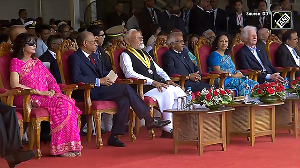During its drought days, the Indian cricket team was derided for its amazing ability to snatch defeat from the jaws of victory. Similar disparaging thoughts spring to mind after witnessing the incredible defeat of the Bharatiya Janata Party-Shiv Sena alliance in the Maharashtra state assembly election.
The Maharshtra Assembly Election
It is truly astonishing how the saffron alliance, despite the odds being stacked in its favour, has succeeded in losing the election, allowing the Congress-NCP alliance to retain power, in spite of its terrible record of bad governance and worse. There is no consolation in the fact that neither of the contestants has been able to secure a clear verdict of 145 and more.
Conventional wisdom, tried and tested, suggested that the Congress-NCP alliance would find it difficult to bat on a pitch queered by its appalling performance over the last five years. The incumbent government went to the polls burdened with a whopping debt of Rs 97,000 crore and a bankrupt exchequer, tainted by the spectacular Telgi scandal, scarred by hunger deaths among impoverished tribes and suicides by farmers driven to despair by a callous administration, and hobbled by miserable failure on the internal security front. Yet, it has won for itself a fresh term.
The BJP can arguably seek to deflect criticism by pointing out that it is the Shiv Sena's poor performance that has let down the saffron alliance. After all, the results show that while the BJP has been able to hold on to its 1999 tally, the Sena has slipped. But that would be both specious and self-defeating, not least because the BJP has managed to win just about half the seats it contested.
One could be facetious and point out the drubbing received by the BJP's socialite candidate in fashionable Bandra at the hands of a self-confessed 'gali ka chhokra' who contested on the Congress ticket as indicative of the voting pattern that resulted in the saffron alliance's debacle. But the very fact that the BJP, which once prided in connecting with India's unwashed masses and salaried middle class, is now so easily dazzled by glitz and glamour is symptomatic of the malaise and the rot that has set in.
Of course, the Sena must own up to its role in ensuring an unmitigated disaster for the saffron alliance. The deplorable linguistic chauvinism that marked the Sena's campaign in Mumbai has been repudiated by voters not only in that city but in other urban conglomerates like Pune and Nagpur.
Balasaheb Thackeray tried to foist his son on the party and the people; this has been accepted by neither. Its poor choice of candidates in constituencies that would normally vote for the Sena ensured fragmentation of support because of rebel candidates. Even the neighbourhood of Matoshree (the Thackeray home) has voted against the Sena.
All this and much more can be catalogued as the Sena's contribution to the saffron alliance's defeat. But that will not mitigate the BJP's loss, nor shall it detract from the fact that the BJP's stakes in the election were many times more than those of its senior partner -- not at the level of individuals, but for the party organisation at the national level.
Commenting on the election results, Sushma Swaraj, senior leader of the BJP, has claimed that the Congress-NCP alliance benefited from the popular perception among voters that it is wiser to vote for the party that is in power at the Centre so that the gravy train passes through their state. This is true, but it is not the entire reason why, as she put it quaintly, 'the game is over for the BJP.' For the real reasons, the party must look within, and come up with an appropriate response.
Sanctimonious, declaratory statements of 20-point action programmes and 10-point conclusions, as were issued after the BJP-led National Democratic Alliance's defeat in the parliamentary election, may serve to beguile the naïve and the uninitiated, but they do not pave the way for political resurgence and electoral recovery. For that, the party organisation requires to be overhauled and converted into a fighting force with a killer instinct.
L K Advani, who virtually reconstructed the BJP from the ruins of the 1984 debacle when the party was reduced to a pathetic presence of two MPs in the Lok Sabha, did precisely that -- he fashioned an ideological identity, Hindutva, compatible with contemporary Hindu political aspirations, that gave the party its cutting edge, enthused the cadre and consolidated Hindu votes, enabling the BJP to come to power in key heartland states and later in Maharashtra. By balancing ideology with electoral pragmatism in the form of alliances, the BJP led the National Democratic Alliance to power at the Centre.
Somewhere along this long march, between, to quote Advani, 'playing the role of A K Hangal,' small but no doubt crucial, in Indian politics, and coming to power, the BJP chose to first dilute and then entirely give up its ideological identity, thus losing its unique and overarching instrument of political mobilisation. It need not have done so. But it chose to become all things to all people, in the hope of acquiring a larger constituency.
Here today, gone tomorrow, back day after commitment to ideology is duplicitous politics; coining synonyms for professed ideology, as the BJP has been doing for Hindutva, is pretentious posturing. Such chicanery first confuses a party's cadre and voters, and then angers them to the extent of recording their rejection. For evidence, look at the BJP's resounding defeat in the Bidar Lok Sabha constituency, which the party had consistently won for the last 13 years. If Uma Bharti's Tiranga Yatra has failed to sway voters in Karnataka, Sushma Swaraj's Veer Savarkar Andolan has not touched an emotive chord among voters in Maharashtra.
Along with ideology, idealism has been given an unceremonious burial by the BJP. Bangaru Laxman and sundry leaders have merrily sullied the BJP's reputation of integrity and honesty while others mysteriously afford a lifestyle that has alienated both cadre and voter. 'Collective leadership' is a ruse to hide a house divided by wrangling over power, perks and office; unbridled ego has come to substitute the humility that once endeared BJP's leaders even to the party's worst critics.
It is, therefore, not surprising that instead of expanding its constituency, the BJP has been successful in shrinking it; instead of consolidating and building on the Hindu vote, it has been successful in consolidating the Muslim vote against it; and, instead of adopting a dynamic political agenda enabling it to connect with the masses, it has become a prisoner of individual aspirations far removed from popular imagination that is being increasingly captured by Sonia Gandhi and her Congress.
Pillorying Pramod Mahajan for the party's defeat in Maharashtra may be the easiest way for the BJP leadership, such as it is, to escape collective responsibility for the mess in which the party finds itself today. And put off corrective action for another day, lest egos are bruised and abilities questioned. The alternative is to confront the defeat in Maharashtra with ruthless, hard-headed determination to restore the primacy of ideological identity, resuscitate a fast atrophying party organisation and revive faith among party workers. Not by resorting to pious declarations, but through visible action.






 © 2025
© 2025